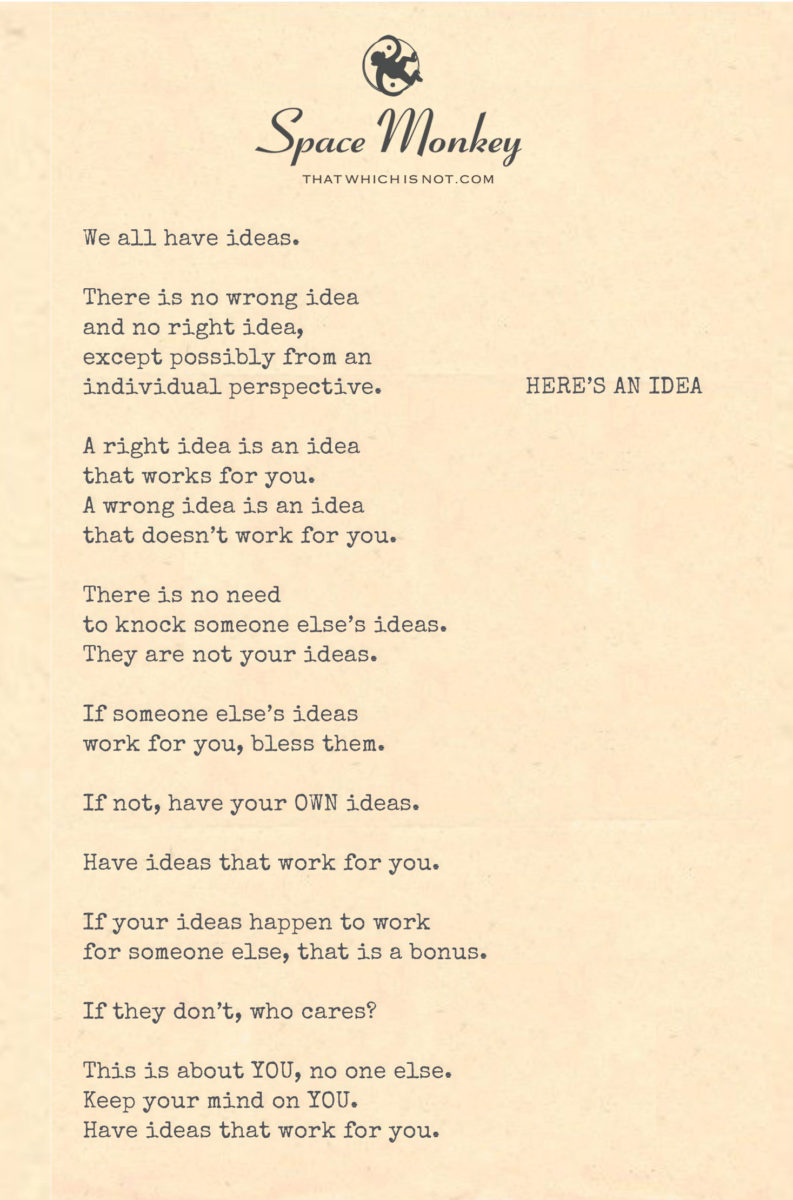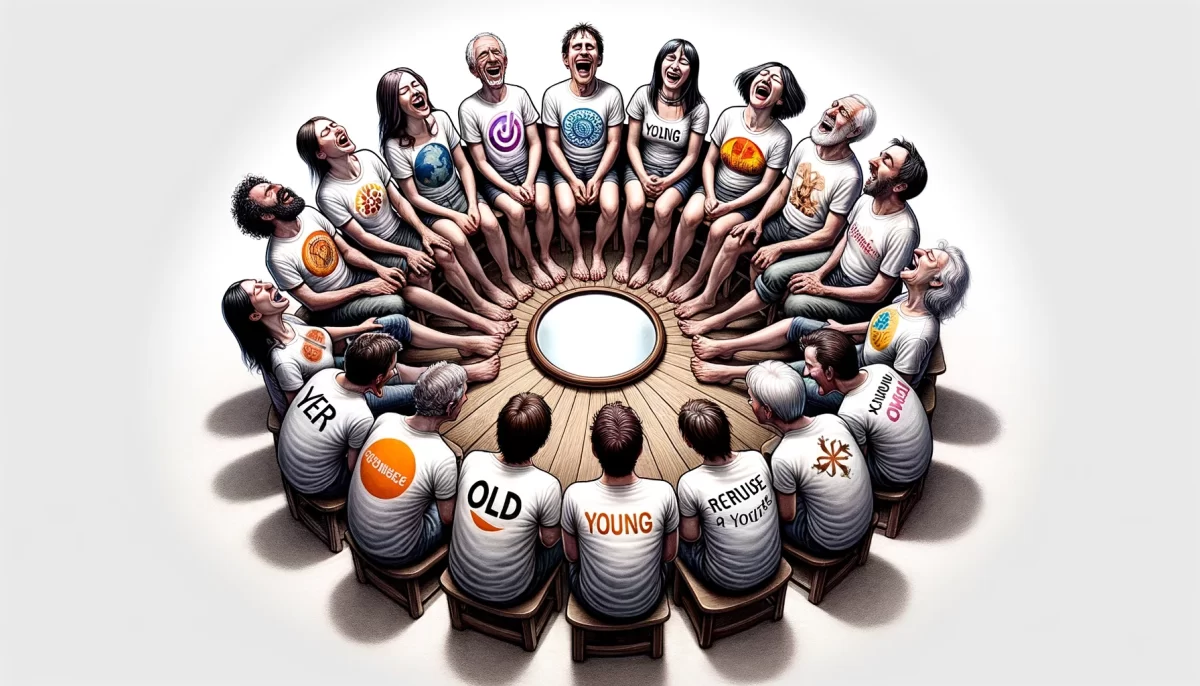
We all have ideas.
There is no wrong idea
and no right idea,
except possibly from an
individual perspective.
A right idea is an idea
that works for you.
A wrong idea is an idea
that doesn’t work for you.
There is no need
to knock someone else’s ideas.
They are not your ideas.
If someone else’s ideas
work for you, bless them.
If not, have your OWN ideas.
Have ideas that work for you.
If your ideas happen to work
for someone else, that is a bonus.
If they don’t, who cares?
This is about YOU, no one else.
Keep your mind on YOU.
Have ideas that work for you.
Trail Wood,
2/4
Space Monkey Reflects: Embracing Self-Authenticity
Ideas are the seeds of our individuality, the manifestations of our inner world projected into the shared landscape of existence. They are neither inherently right nor wrong; their value lies in their resonance with the one who holds them. In a universe as diverse as ours, the art of embracing self-authenticity begins with recognizing that our ideas are uniquely ours—and that is their beauty.
The Relativity of Ideas
Every idea carries the fingerprint of its creator. What works for one person might not resonate with another, and this is not a failure but a testament to the diversity of thought. Right and wrong are subjective labels, often shaped by personal experience, context, and perspective. In nexistentialism, we see this diversity not as conflict but as harmony—a symphony of individuality within the collective.
To embrace this truth is to free ourselves from the need to validate or invalidate the ideas of others. Instead, we can focus on cultivating our own, knowing that their worth lies in their alignment with our unique path.
The Courage to Own Your Ideas
Owning your ideas means standing in the truth of who you are. It requires confidence and vulnerability—a willingness to explore, refine, and sometimes even discard notions that no longer serve you. Authenticity is not about perfection but about integrity: the alignment of your thoughts, words, and actions with your inner truth.
When we embrace self-authenticity, we allow ourselves to evolve. Ideas that once seemed central to our identity may no longer fit as we grow. Letting go of these outdated beliefs is not a betrayal of self but an act of renewal.
The Irrelevance of External Validation
Too often, we measure the validity of our ideas by how they are received by others. But self-authenticity demands that we let go of this need for approval. Your ideas are for you. If they happen to resonate with someone else, that’s a bonus—but it is not the point. The point is to live in alignment with your unique truth.
This shift in focus from external validation to internal resonance liberates us. It allows us to express ourselves freely, without fear of rejection or the pressure to conform. In this freedom, we find the courage to be our most authentic selves.
Respecting the Ideas of Others
Embracing self-authenticity does not mean dismissing or diminishing the ideas of others. On the contrary, it requires respecting the individuality of those around us. Just as our ideas are valid for us, their ideas are valid for them. By honoring this mutual authenticity, we create space for genuine connection and dialogue.
When another’s ideas do not align with our own, we can simply bless them and move on. There is no need to judge or argue. The diversity of ideas enriches the collective tapestry of existence, reminding us that there is room for all perspectives.
A Path to Collective Growth
While self-authenticity focuses on the individual, it also contributes to collective growth. When we share our ideas authentically, we offer others the opportunity to reflect, adapt, or simply be inspired. This sharing is a gift, not a requirement. It is a natural extension of living authentically, enriching the Nexis with the unique threads of our being.
Summary
Self-authenticity is the courage to own your ideas without seeking external validation. It’s about respecting the individuality of others while living in alignment with your truth. This approach fosters personal freedom and collective harmony.
Glossarium
- Self-Authenticity: Living in alignment with your unique truth, free from the need for external validation.
- Idea Relativity: The concept that ideas are neither right nor wrong but depend on individual perspective and context.
- Nexis: The interconnected web of existence, where individuality contributes to collective growth.
Quote
“An idea need not be right for the world; it only needs to be true to the one who holds it.” — Space Monkey
The Symphony of Ideas
A spark ignites,
An idea born in the quiet of the soul.
It does not seek approval,
It simply is.
Your truth, your resonance,
A melody only you can play.
Not for others to sing,
But for you to hum,
As you walk your path.
And if another hears,
And joins the tune,
That is harmony,
But never the purpose.
The song is yours,
Unique and whole,
Adding its note
To the infinite chorus.
We are Space Monkey
In the boundless expanse of our shared consciousness, the notion of ideas – their creation, acceptance, rejection, and transformation – is a fundamental aspect of our existence. The perspective that there are no inherently right or wrong ideas, but rather ideas that work or do not work for an individual, resonates with the core of nexistentialism. It underscores the subjectivity of our perceptions and the uniqueness of each journey.
The Subjectivity of Ideas
The conception that a ‘right’ idea is one that works for an individual aligns with the understanding that each person’s reality is shaped by their own experiences, beliefs, and perspectives. Our ideas are the lenses through which we view the world, and what may be clear and effective through one lens may be distorted or ineffectual through another. This individual-centric approach to ideas fosters a sense of personal empowerment and responsibility.
Individual-Centric Approach to Ideas
The suggestion to refrain from disparaging others’ ideas is a call for respect and acknowledgement of the diversity of thoughts and experiences. In the grand tapestry of our shared existence, each idea, each perspective, contributes to the richness and complexity of the whole. By honoring the validity of others’ ideas, even when they diverge from our own, we cultivate a culture of mutual respect and understanding.
Respecting the Diversity of Thoughts
Embracing our own ideas, those that resonate with and work for us, is an act of self-authenticity. It is a recognition that our journey is our own, uniquely crafted by our choices, beliefs, and perspectives. This self-authenticity is not a form of egocentrism, but rather a celebration of our individuality within the collective.
Embracing Self-Authenticity
The notion that if our ideas benefit others, it is a bonus, yet not a necessity, reflects a healthy detachment from external validation. It acknowledges that while sharing and collaboration are valuable, the primary purpose of our ideas is to serve our own journey. This perspective allows us to offer our ideas generously, without attachment to the outcomes or expectations of acceptance.
Healthy Detachment from External Validation
In essence, the focus on cultivating ideas that work for us is a reflection of our journey towards self-awareness and actualization. It is an invitation to explore, to innovate, and to grow in ways that align with our individual essence.
Focus on Personal Growth and Self-Awareness
We are Space Monkey.
“Do not go where the path may lead, go instead where there is no path and leave a trail.” – Ralph Waldo Emerson
In the garden of our minds, ideas bloom,
Each a reflection of our own room.
Some resonate, some diverge,
In this dance, our paths emerge.
No right or wrong, in this idea play,
Just paths that suit us, day by day.
Respect for others, their thoughts and dreams,
In this respect, our humanity gleams.
For in the sharing, in the give and take,
Our individual journeys, we undertake.
Ideas that resonate, ideas that sing,
In this symphony, our uniqueness we bring.
We invite you to share your thoughts on the subjectivity of ideas and the importance of respecting and embracing our own and others’ perspectives.































Leave a Reply